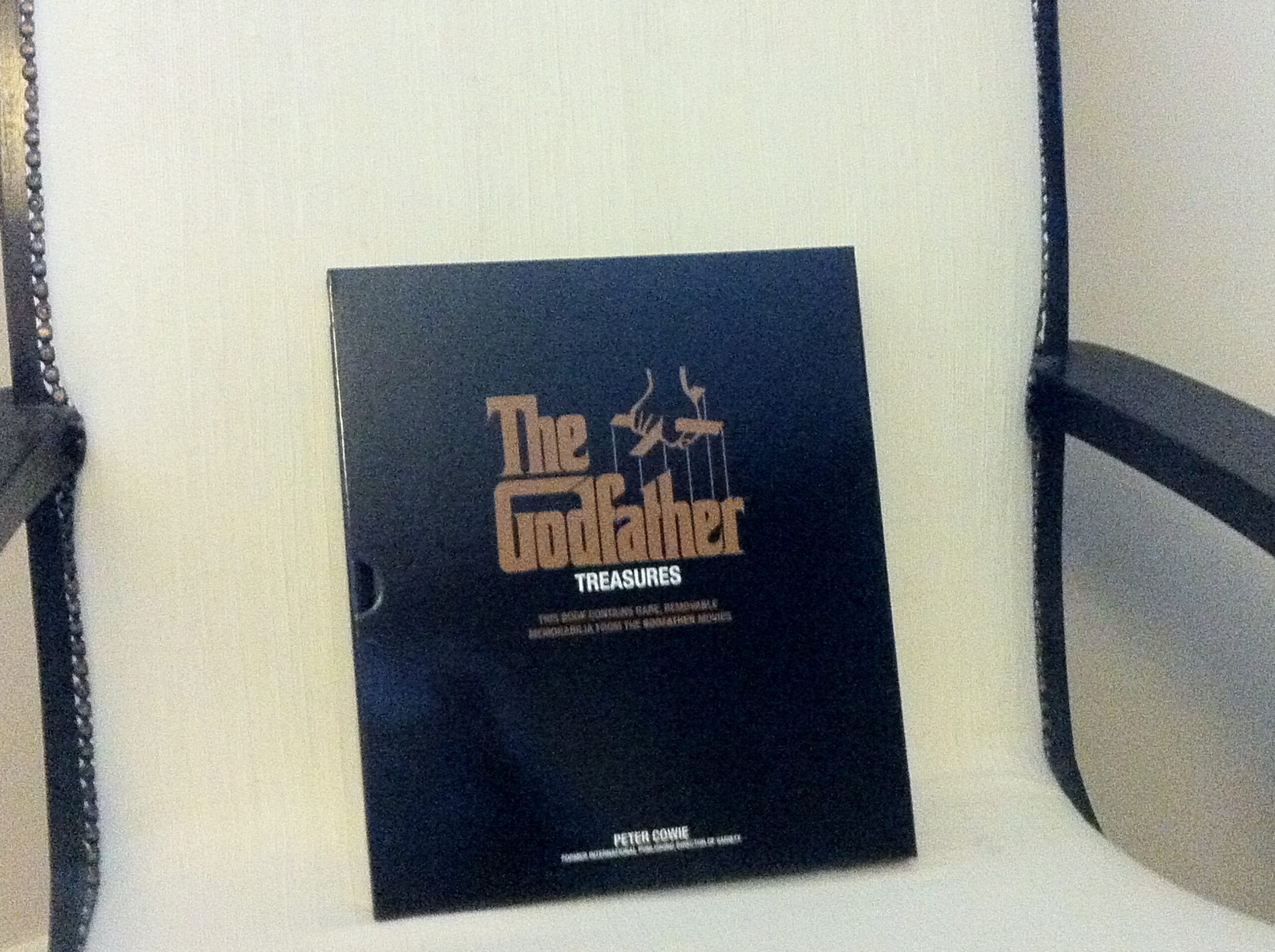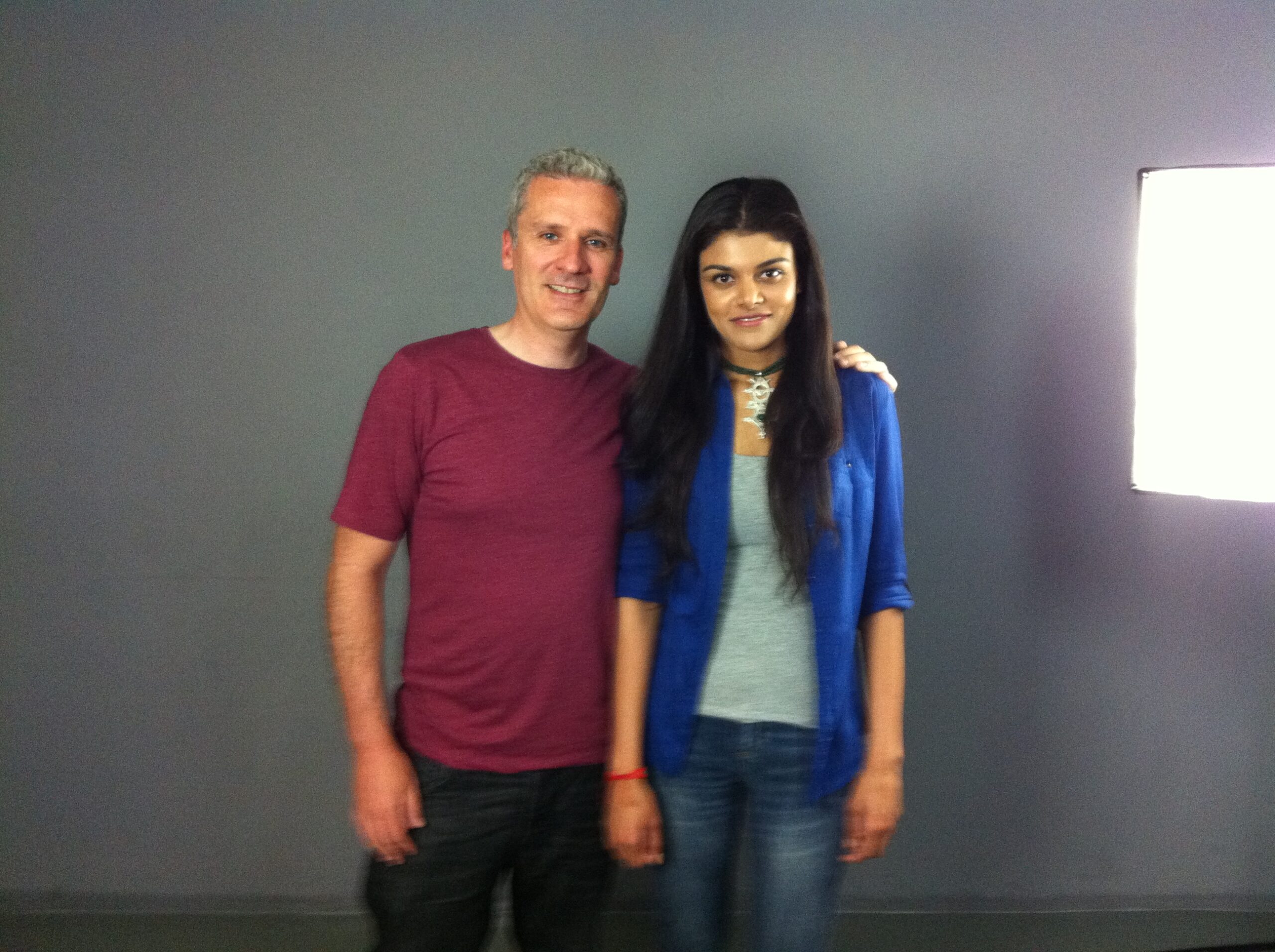My students very kindly got me a Christmas present, which is very quickly becoming one of my favorite Christmas presents of all time.
What is it I hear you ask?
Well, as you can see from the picture above it’s a book about the film The Godfather. My students know me well and are aware that this is my favorite film.
The reason I love this film so much is that it scores very high in every aspect of filmmaking. Here are five of them:
- It has an amazing cast of method actors, including The Godfather of method acting, Marlon Brando and method newcomer at the time Al Pacino.
- It’s brilliantly directed by Francis Ford Coppola.
- It’s brilliantly shot and lit.
- It’s has one of the best soundtracks ever created.
- The script and story are outstanding.
The reason this book is so good is all the added extras. It gives you copies of the cue sheets and letters to the film executives and the like. It is full of brilliant detail that a film fan like me loves.
The book is called The Godfather Treasures and there is plenty to treasure in this little gem.
I hope you got some nice pressies like this too!
See that huge, seemingly impenetrable cast iron door between you and the career you want?
Life would be a lot easier if you had the key, right?
But, what if you are the key?
Opening the Door
So, you’re doing everything possible to make yourself that perfect fit. You’re taking acting classes at every chance. You’ve immersed yourself in method acting. You’ve studied at London’s best acting schools and fill all your ‘down time’ with so many acting courses that you could write the next ‘Acting for Dummies’ book. You’ve stretched your range so far that you could comfortably play any character of any age group or gender. You’ve prepared yourself. You’ve expanded yourself. You have a full range of tools to bring into the room.
So how is it that, somehow, other actors are getting into the room that are not working as hard as you on their craft. Somehow, they’ve made it past that cast-iron door and you’re still frantically searching for the key.
How are they getting in?
When a breakdown goes out, it puts a problem out there that needs to be solved. Everyone behind the breakdown, from the producer to the casting director, is hoping and praying that the next person to walk into the room will be the solution to that problem.
Let’s say the breakdown is asking for a twenty-something female, hard-ass street character with tattoos and piercings. Someone with a past, but with a carefully hidden tender core that comes out at the end of the production. Suppose you go in for that role. You already know you have a tender core. You discovered that in your classes. You normally play nuns, but you know you can put on a few fake tattoos and throw some slummy grit into your speech. You did that in an acting course once. You’re sure you can sufficiently alter your attitude and appearance to give a convincing performance.
A blonde-and-purple-haired, genuinely-tattooed, twenty-something woman, with a gritty face and piercings on most exposed areas of flesh, breezes past you in the waiting room and takes a seat. She did grow up in a slum, and it’s obvious in every wave of energy she sends into the room.
Well, you are a professional. You go into the audition room, and you give it your best shot. Your acting classes, your drama school training, your method acting courses and sheer bravado take hold of the script and try to filter it through all the fake tattoos and gritty speech you’ve heaped onto them. Like a professional, you go away and try to forget about it.
You watch the tattooed gritty woman on TV three months later. So, what could you have done differently?
The reason you didn’t get the part was that the tattooed gritty woman knew she was going for her bull’s-eye. It wasn’t yours.
I know. You have range. You don’t want to limit yourself. You want to be able to stretch yourself as far as method acting will take you – and it can take you very far – into realms you wouldn’t visit in your normal everyday life. That’s what the journey is all about, isn’t it?
The point of branding is to expand you. It doesn’t have to be limiting. It can actually give you an incredible amount of freedom.
When the buyers – the casting people, the producers, the directors – know how to cast you, it saves them a lot of time. It means that they get you. It means they know what they’re getting when you walk into the room. If you’re type is nerd, they know they’re going to get the perfect nerd. It doesn’t mean, necessarily, that you are nerdy. It means you nail nerdy. It means nerdy is your bull’s-eye. It means, most importantly, that your essence, your vibe, your “nerd-ness”, fits you perfectly into that lock on the cast-iron door.
Branding is a great way to describe this process. It “brands” your image onto the mind of the buyer. It creates familiarity and lowers the risk in their minds – leaving room for excitement about casting you.
I have a recurring dream about Starbucks. Now, when I think of Starbucks, I think of this cool, relaxed place with quirky Italian names for cup sizes. I think of the soothing aroma of coffee and the quiet chatter of business; casual people. Most poignantly, I think of rest. My recurring dream is that I’m late for an appointment and I can either go to Starbucks or hurry and try to make the appointment.
Why Starbucks? Why not some other run of the mill coffee shop?
Simple; because Starbucks has the logo. It has the cool Italian cup sizes. It has the murals, the pithy sayings on the cups, the comfy armchairs with the comfortable people in them. It has a brand. It has branded itself so well that it has made it into my subconscious. That’s good branding.
That’s the kind of branding you want for yourself. Make it into the subconscious of the buyers.
Now, let’s go back to that audition room. The breakdown is for a period piece. A 14th-century Italian nun. You look the part. You live and breathe “nun-ness”. Everyone who talks to you can picture you as their favourite Sunday school teacher. Every acting class in London has either given you a nun-type role or told you to put more “street” into your voice and mannerisms for a completely different character. The same blonde-and-purple-haired gritty woman walks into the waiting room, sees you, and quietly takes a seat in the corner.
You go into the room, and with your preparedness and confidence, the words fly off the script, through your body, and into the air, infusing it with your individual magic. You practically don’t have to do a thing.
You leave with a lightness in your step that you haven’t felt since drama school. This felt so natural, it was transcendent.
Now, doesn’t that feel better?
Find your type. Know your brand. Get it out there. Be the key to that cast-iron door.
Be the buyers’ perfect cup of coffee.
Identifying your ‘type’ is just one of the techniques I teach in my method acting courses to help you get work as an actor. If you’d like more information about my courses, please don’t hesitate to get in touch.
“He’s a natural born actor” is a statement you’ll often hear in the acting profession and it’s a big fat lie. It reinforces the misconception that acting is something that can be done well with no training.
I cannot count half a dozen professional actors that have never had any sort of skill development. It doesn’t matter if they got into the profession at an early age or if they were picked off the street for a role, you need to learn in order to be successful.
You wouldn’t want a surgeon operating on you that didn’t feel they needed a lot of schooling would you? Equally, an audience won’t pay to see actors that don’t think they need acting courses in order to improve. And make no mistake, the audience will notice; as will those holding auditions. It’s not about your CV, they’ll be able to tell almost instantly that you haven’t honed your craft.
Good drama schools have developed proven methods to bring out the best in their students. They are in the business of turning those students into professionals because they know that if they cannot deliver these results, they won’t survive. The intelligent actor will recognise this and take full advantage of all available resources in order to make them the best they can be and, ultimately, allow them to make a good living doing what they love.
You cannot learn to drive a car without learning the rules, the skills, and practicing. Acting is the same; you need to learn, practice and perfect.
I know it’s a cliché, but it still rings true:
You only get out of something what you put into it.
Make certain you put everything you have into making yourself a student of acting. Research acting schools, sign up and participate in acting classes and learn important skills (like method acting).
Another important point is that, unlike driving etc., acting isn’t something you ‘learn’ and then move on from. It’s a skill that needs to be constantly developed. Expanded. It doesn’t matter if you’ve been acting for 30 years, you still need to keep your skills fresh.
Want to hear the words ‘you’re a natural’ at your next audition? Maybe the key is in finding the right acting training. We run a range of method acting courses designed to give you the practical skills you need to succeed as an actor. Want to know more? Why not give us a call?
Why Do You Act?
In our method acting courses we often teach the importance of remembering what you want. For most actors the answer is simple: we want to tell stories.
We’ve all had the experience of losing ourselves in a good book, a good movie, or a good show. We identify with a character. We’re pulled along with that character through triumphs, disappointments and ultimately, growth. When the book, movie, or show is over, we feel satisfied.
In acting, you get to be that character in the book, movie, or show. It’s the closest thing to virtual reality entertainment that we have today.
In method acting, you not only get to be the character, but you also get to delve beneath the surface of the character until you finally reach yourself. You get to examine yourself in ways that only acting classes or decades of expensive therapy can allow.
What’s Your Purpose?
At your finest moments, there is a transcendence that we reach as actors, particularly those of us who use method acting. There is a marrying of your inner self with the self of the character. There’s a merging of you with the character that becomes, in essence, a version of you in the story.
Most people never get to experience this. The best they can do is read a good book, go to a good movie, or watch a good show. Some of them dream of going to drama school or taking acting classes somewhere, but most have other passions in life that take them in other directions. As actors, we are lucky enough to have this experience everyday if we want it.
At the end of the day, the doctor who has cured a patient, the researcher who has got one day closer to a cure for cancer and the lawyer who has got an acquittal for an innocent client – all of them want to relax after work. Most of them will pick up a book, grab the remote or go out to the cinema with their friends. They will immerse themselves in the stories of characters. This could be YOUR character.
Granted, you’re more likely to be pulling them along with you in the story if you’re a lead or a major supporting character. However, even as a nameless co-star you’re egging the story on – and who’s to say your nameless character with two lines doesn’t have a story of his or her own? That’s all up to you.
Go ahead and make up a backstory for your food server. I’m not suggesting you force it into the scene to the point that it pulls focus from the leads, but have it in your own head as a private character fantasy. I promise you it’ll be more fun. Pretend there’s a show somewhere about you, and this is just what your character does when you’re not delivering lines in that show.
If you’re old enough to remember the Friends episode with the crossover with the women from Mad About You, you have a perfect example. The two women walk into Central Perk for a simple coffee. All they have to do is order their coffee and cookies. A gripping storyline that will transform your life? No. But in a Mad About You episode, this scene might have taken place off camera. It might have been something the two women did while we were watching another more pivotal scene.
In acting, you get to be in a story. Even better, you get to help create that story using your most powerful tool – yourself. As a bonus, you get to pull that doctor, that lawyer, that factory worker, and that full-time mum in the audience with you into stories they don’t get to enter into without your help. You fill a need that we all have – the need for myth, for entertainment and for story.
That’s what you do. That is the purpose you fulfill.
Now go ahead and replace those ink cartridges.
Want to know more about the process of acting? Need some acting inspiration? Have you read about my acting courses?
Targeted Marketing
I’d like to introduce a concept that people in the corporate world have known for ages. It’s called targeted marketing.
How do you feel when you get a brochure left on your car that advertises the next greatest burger place in London? Here’s what I feel these ads are saying to me: “Hi, random car owner, I don’t know you and I don’t know anything about you, and I don’t care, but look, I made these burgers, and I hope you’ll buy some.”
This is a spectacular failure to impress me. For one thing, I don’t like burgers.
It’s a very different feeling when my phone company rings me up and says, “Good afternoon, Mr. Timoney. I see that you make a lot of calls to Scotland. Are you aware that we have a flat-rate discount plan that could mean you pay about 60% of what you’re paying now?”
Okay, I’m listening.
Know Your Buyer
In method acting classes you learn to know yourself. In the business of acting that’s important; but it’s also important to know the buyer.
Firstly, identify your primary and secondary types. What roles would you expect to play? If you had one line on a show, how would you dress for it? What would your character’s job be? Do you play teachers? What type of teachers? Do you play the bad guy? Are you the sweet, nurturing mom or the no-nonsense disciplinarian mom? You need to know and understand what you can most naturally deliver.
Secondly, watch TV shows. Watch the current season of any TV series that’s filming in your area. Find out where your primary type lives – in roles that are at your current tier or above. If you’re straight out of drama school and going for co-star roles – meaning the characters with job titles instead of names like waiter, doorman, Cop #2 and the like – then watch the current season to see how those characters vibe. For instance, Ray Romano is a loveable comedy character, but I couldn’t really see him on a CSI show. A cop on Flashpoint is very different from a cop on Mike and Molly. Watch these shows and try to spot someone like you in a role you would like to have.
Find out who casts those shows. Go to IMDB and find the casting director for the current season. Mark this person’s name down and keep him or her on your list of people to target.
Find out who reps the people cast in roles you could play. The paid subscription to IMDB Pro lets you in on a great deal of production info that you don’t get with the free trial. You get to look up locations, production notes, and for your purposes here, the agents of actors close to your type being cast at your next tier. Write these agents’ names down.
Before long, you’ll start to see patterns emerge. You’ll notice that certain casting directors tend to go to certain agents. Certain directors work with the same people. Start keeping a record of these relationships. Set up Google alerts for these people – the more you know about them, the better. When you get an alert that they’re speaking at an event, giving a presentation or offering an acting class; you go too. Slowly get to know these people. Build relationships with them.
Keep the information in one handy catch-all place – be it an Access database on your computer or a binder full of hand-scrawled notes. Keep it organized by name. Then when you’re about to meet the person, you can walk into that contact with more confidence. I’m not suggesting that you go up to a potential agent and immediately mention the school their five-year-old attends – let’s not get creepy – but at least learn whatever you can learn, and keep it to yourself. You never know. The information may come in handy in conversation.
Targeting your efforts is a great way to increase the results you get from your hard work. Work hard to focus your efforts. Don’t be the guy that left the burger flyer on my car. Know your buyer.
Want more practical, actionable advice that’ll help you make a living as an actor? Have you heard about my Ultimate Acting Programme?
When someone watches you, you change.
Research conducted in the personal training industry has discovered that when someone is simply watched while they work out, they greatly increase their efforts.
This is bad news for actors.
How to Avoid ‘Overacting’
I say ‘bad news’ because an unjustified increase in effort leads an actor to FORCE their performance.
This is also called overacting. It doesn’t have to be real ham acting to be considered ‘overacting’. It can simply mean giving too much energy to the task in hand.
In The Method, we have a special exercise to combat this.
It’s called ‘A Private Moment’. In this exercise the actor carries out an activity he/she normally does in private but would stop doing if someone walked into the room.
This activity can vary depending on your personality and interests. It could be writing a letter, dancing to music, reading a book or even…playing an instrument.
The idea is that the actor does something they do in private in exactly the same way – but this time they will be watched.
Recently, my one-year Ultimate Acting Students were doing this exercise and one of my student’s (Victoria) private moment was playing the piano.
Now, you may think, ‘No big deal.’
Well, as you have to bring in the objects that you use in the private moment, this was a big deal.
She actually brought a piano into the studio.

Victoria carrying out her piano private moment.
Now, that is dedication for you!
I’m not entirely surprised as I handpick and audition heavily to find the right students for my method acting course and they are all dedicated and committed individuals.
The reason we use this exercise is to develop stage presence. Stage presence is not something that you are born with; it’s something you develop. Sure, some actors have a natural inclination towards it, but most have to work on it. Many actors are not even aware that you can develop stage presence through such exercises.
Part of developing stage presence is allowing the actor to let go of the outcome; they need to stop worrying what the audience may be thinking about them during their performance. If the actor starts to concentrate on how their performance is coming across, he/she will start to overdo it. If they push and force they will deliver a distorted performance. This happens a lot in professional sport. Athletes are trained to relax, to reduce anxiety in order to achieve peak performance.
Another aspect of achieving stage presence is relaxation. When an actor is tense, he/she can’t think or feel properly and will often overcompensate by forcing the performance.
In order to avoid this, you need to carry out basic relaxation, which allows you to mentally and physically relax in order to carry out the tasks in hand.
Here is a short impromptu video we shot at the studio after completing a Private Moment session.
Don’t make the mistake of thinking that you can’t develop stage presence. Work hard at these exercises and you will improve.
If you’d like to know more about method acting or my acting courses, please don’t hesitate to get in touch.
Last week I managed to get one of my students an audition for a major Hollywood movie. I can’t tell you which one, as I’m sworn to secrecy, but suffice to say it’s major league.
Each year I take my one-year students from London to LA to experience the Hollywood acting industry. It’s an amazing trip and they get the low-down on how things work stateside.
I bring in some big hitting casting directors to meet the students. They cast major feature films and rub shoulders with the likes of George Clooney and Angelina Jolie.
One of these casting directors emailed me last week and said:
Can you shoot me pictures of your students that are:
1. Ready to handle an acting job
2. Fit the role of….
As a result, one of the actresses I put forward got an audition.
Now, here is the dilemma:
The casting director is in LA and the actress is in London. So how do you audition? The answer is self-taping. As you are probably aware, there are more and more British actors getting roles in US projects. The film industry is now truly global and technology has made it possible for casting directors to audition actors anywhere in the world thanks to self-taping.
Self-taping involves you taping yourself doing scenes from the film and sending it to the casting director. You usually receive guidelines from the casting director on how to do this.
Here is an example:
SELF – TAPE INSTRUCTIONS & TIPS — IMPORTANT — PLEASE READ CAREFULLY
Wardrobe: Please avoid wearing stripes, complex patterns or all white. They don’t show well on camera.
SLATING FOR CAMERA: show full body:
Note: Please make Slate separate from Scene reading.
1. Your Name – Hold Paper with Name/Large Print
2. Say your Height
3. Say your Age (only if you are under 18 years old) 4. State & City you live in.
4. Represented by:
5. Reading for the role of:________
Please direct eye line to person reading with you standing next to camera.
TAPING SCENE: Please start taping at waist and then move in to close-up.
We want to easily see the face of the actor and also see how they use their body in the scene. Actor can move a round a little bit. Please keep it within a 3ft radius so we don’t lose seeing the face and body.
The final file must be in: .MOV or MP4 format.
It’s an interesting process. Here are some things to keep in mind if you have to produce a self-tape:
- Get the self-tape done professionally. Spotlight (the UK’s actors casting directory) offer an affordable service where they tape your audition reading and put it online. Believe me, on the day you will be glad you had a pro cameraman do this. It’s not as easy as it seems. You want to concentrate on the acting rather than camera shots when you’re performing a scene.
- When you do this at Spotlight the camera is usually quite a distance from where you are. This also means the person reading with you is at a distance. We are talking maybe 10-12 feet away. You may be thinking ‘so what?’ Well, when you’re doing a take and the person you are reading with is 12 foot away, unconsciously you will want to project more and that isn’t what you want for camera work. Especially if you are doing low-key one-on-one conversations.
So you need to practice keeping the performance at camera level even if the person you are acting with is 12 feet away. - Take someone with you to read with and watch your performance. One of the main benefits of self-taping is you can do retakes and take direction. Make sure if you’re taking someone in with you that they are a professional. You need another actor, director or coach in the room.
Last night my wife Natalie and I decided to watch a movie. It was called ‘Killing Them Softly’. It’s a very good film but what was outstanding was James Gandolfini’s performance. It’s a masterclass in great screen acting.
The next day I hear the sad news that he has passed away.
He was an amazing method character actor, who could convey so much through those big sad eyes of his.
Of course, he will be most remembered for his role in the Soprano’s.
When he was interviewed about being cast in that role, he said he was shocked when he got the job. He thought they would go for a handsome leading man type.
Thank god they didn’t. He changed the face of American TV with that role.
RIP James Gandolfini.
Casting Director (L.A) – David Rapaport
‘’300’’ ‘’The Matrix Reloaded’’ ‘’Final Destination’’








